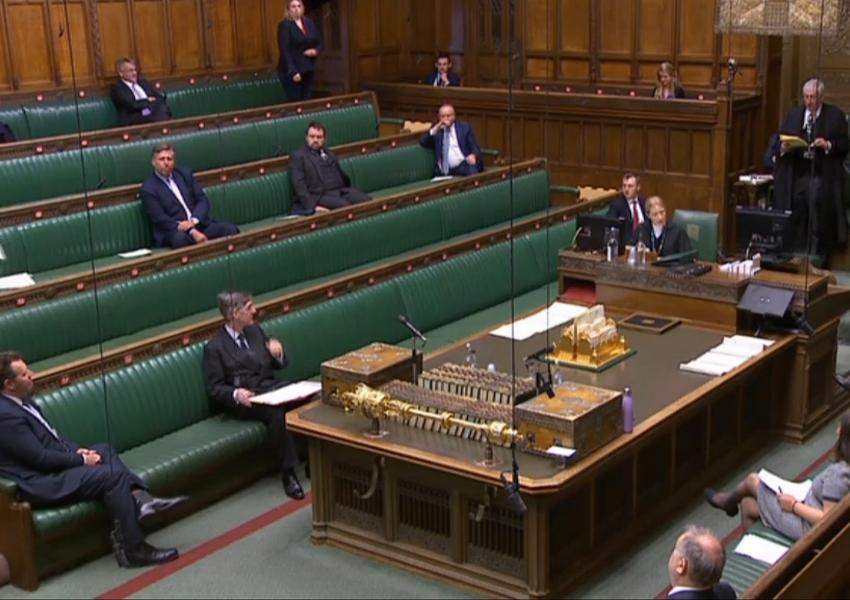
UK Report Suggests Blacklisting IRGC, Toughening Stance On Iran
A report published today [December 16] by the Foreign Affairs Committee of the United Kingdom parliament’s House of Commons has proposed that Britain no longer treat Iran’s nuclear policy as separate from other issues, including human rights, “hostage taking,” Iran’s missile program and its regional relationships with “Shia proxies and armed groups.”
The report, No Prosperity without Justice, the result of six months’ work, comes as United States President-elect Joe Biden and Iranian President Hassan Rouhani have both spoken of reviving Iran’s 2015 nuclear agreement with world powers, the JCPOA (Joint Comprehensive Plan of Action). The agreement was abandoned by President Donald Trump in 2018 when the US turned to the ‘maximum pressure’ of draconian sanctions, prompting Tehran by 2019 to begin steps taking its nuclear program beyond limits set by the JCPOA.
No Prosperity without Justice suggests that “the door is open to diplomacy” but only when Iran ends “destabilizing activities.” It advocates that the UK proscribe Iran’s Islamic Revolutionary Guards Corps as a “terrorist” organization, following the example taken by Trump in 2019.
Citing Lebanese journalist Kim Ghattas, the report claims that the killing in January in Baghdad of the commander of the IRGC Qods (Quds) Force Qasem Soleimani, ordered by Trump, was “welcomed by many Sunni and Shia Muslims who had particularly suffered at the hands of Iran’s proxies to whom the Qods Force had channeled significant resources.”
While quoting differing views given the committee by witnesses – including former British ambassador to Tehran Richard Dalton, active in nuclear talks a decade before the JCPOA, and Behnam Ben Taleblu from the hawkish US think-tank Foundation for Defense of Democracies – the report describes the JCPOA as “controversial from the beginning due to its limited scope.”
It continues: “The deal sought to curtail Iran’s nuclear program, but made no progress in addressing Iran’s human rights violations, or its financial and military support for its network of Shia proxies and armed groups across the Middle East. While the deal was championed by the Democratic administration in the US and the Conservative government in the UK, significant opposition remained amongst the respective congressional and parliamentary members of those parties.”
But the report’s argument that the nuclear program should not be separated from other issues – as the JCPOA did – is moderated by describing replacing the deal “as a long term goal” and its insistence on close co-ordination with the US and other European states.
And without citing the Trump administration, the report notes that “disunity in addressing the nuclear issue, especially between the US and the E3 [Britain, France and Germany],” had “not served the UK’s interests,” but instead had “disincentivized Iranian engagement with the West and presented an opportunity for Russia and China to pursue their respective agendas in the Middle East.”
The report is also open-ended in discussing Gulf security, where it stresses the need for “consultation” with Iran’s southern neighbors and the “UK’s history in the region, and relationship with the member states of the Gulf Cooperation Council.” The report makes no specific proposals over new security frameworks for the Gulf, which has seen a marked arms build-up in recent years.
The Foreign Affairs Committee is chaired by Tom Tugendhat, who has supported Israel in the past, in 2017 described Britain’s policy to Iran as “failed.” In July, the Iranian ambassador Hamid Baeidinejad wrote in a tweet that “The level of hatred that MP Tom Tugendhat has manifested towards Iran is beyond imagination.”
Baeidinejad argued that Tugendhat’s “close work” with “anti-Iran circles in US congress and friendship with opposition lobbies” had “reinforced his illusion about realities in Iran.” The ambassador, however, suggested that Tugendhat lacked influence: “To his disappointment, his radical positions has [sic] gained no support from the House and the UK government.”








